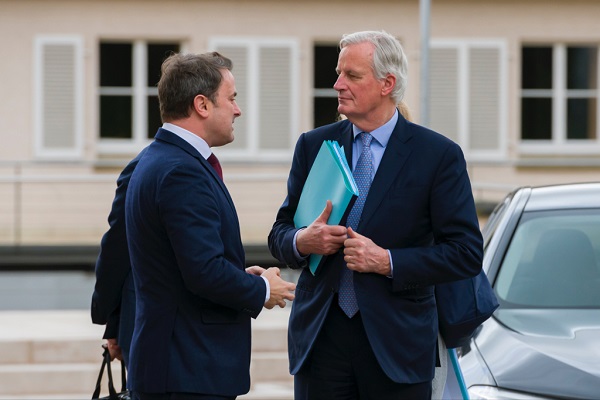 Luxembourg's Prime Minister Xavier Bettel with Michel Barnier, European Commission's Head of Task Force for Relations with the United Kingdom;
Credit: SIP / Emmanuel Claude
Luxembourg's Prime Minister Xavier Bettel with Michel Barnier, European Commission's Head of Task Force for Relations with the United Kingdom;
Credit: SIP / Emmanuel Claude
On Monday 10 February 2020, Luxembourg's Prime Minister Xavier Bettel received Michel Barnier, the European Commission's Head of Task Force for Relations with the United Kingdom, at Senningen Castle.
During his visit to Luxembourg, Michel Barnier joined the Prime Minister, as well as Minister of Foreign and European Affairs, Jean Asselborn, and Minister of Finance, Pierre Gramegna, for a working meeting. Discussions mainly allowed for an in-depth exchange on the future relationship between the European Union and the United Kingdom in light of Brexit.
On this occasion, Prime Minister Xavier Bettel praised Michel Barnier's efforts to date with regard to the UK's withdrawal from the EU. He commented: “First of all, I would like to congratulate Michel Barnier for maintaining the unity of the EU during the negotiations on the British withdrawal from the European Union. It is essential to continue on this path, because only our unity will guarantee the success of the negotiations. Luxembourg therefore fully supports Michel Barnier as chief negotiator to defend the interests of the EU in the negotiations on the future relationship with the United Kingdom".
Regarding Luxembourg's priorities during these negotiations, the Prime Minister noted that "given the importance of services for all the economies of the Union, it is essential to find a pragmatic, efficient and sustainable solution in order to avoid market disruption. With regard to financial services in particular, Luxembourg insists on structured regulatory cooperation between the European Union and the United Kingdom, this in order to ensure predictability and stability for economic operators in this sector".
On the subject of the level playing field between the EU and the UK, Xavier Bettel reiterated his support for the approach of the European Commission: "For Luxembourg, the degree of access to the single market must be proportional to the level and quality of guarantees on the British side with regard to respect for fair conditions of competition. The European Union must also have the means to closely monitor legislative developments in the United Kingdom, so that it can react in the event of major differences”.
For his part, Jean Asselborn thanked Michel Barnier for the good cooperation between his team and Luxembourg's Ministry of Foreign and European Affairs. The Foreign Affairs Minister stated: "It is in particular thanks to the method of Michel Barnier which consisted in taking into account the specific interests of the various Member States, that it was possible to preserve the unity of the European Union".
With regard to the draft negotiating directives presented on 3 February 2020 by Michel Barnier, Minister Asselborn supported a very ambitious trade agreement as proposed by the Commission, stating: "The future agreement must reflect the EU's high standards in social, environmental, climate and tax matters". He added that the new economic partnership with the UK should also be accompanied by financial services equivalences and data protection adequacy decisions. Likewise, the future partnership must include cooperation on external security.
Finally, Luxembourg's Minister of Finance, Pierre Gramegna, welcomed the fact that the EU and the UK had divorced by mutual consent. He explained: “At the level of negotiations on future relations, the approach of the Luxembourg government consists in preserving the close link of the United Kingdom with the European Union and our country. In particular, in terms of financial services, Luxembourg and the City of London have everything to gain. Close ties can remain all the stronger as the United Kingdom moves away from the acquis communautaire".
This working meeting was followed by discussions between Michel Barnier and the President of the Chamber of Deputies, Fernand Etgen, and the President of the Committee on Foreign and European Affairs, Yves Cruchten, as well as members of the parliamentary Bureau, the Conference of Presidents and the Committee on Foreign and European Affairs.








